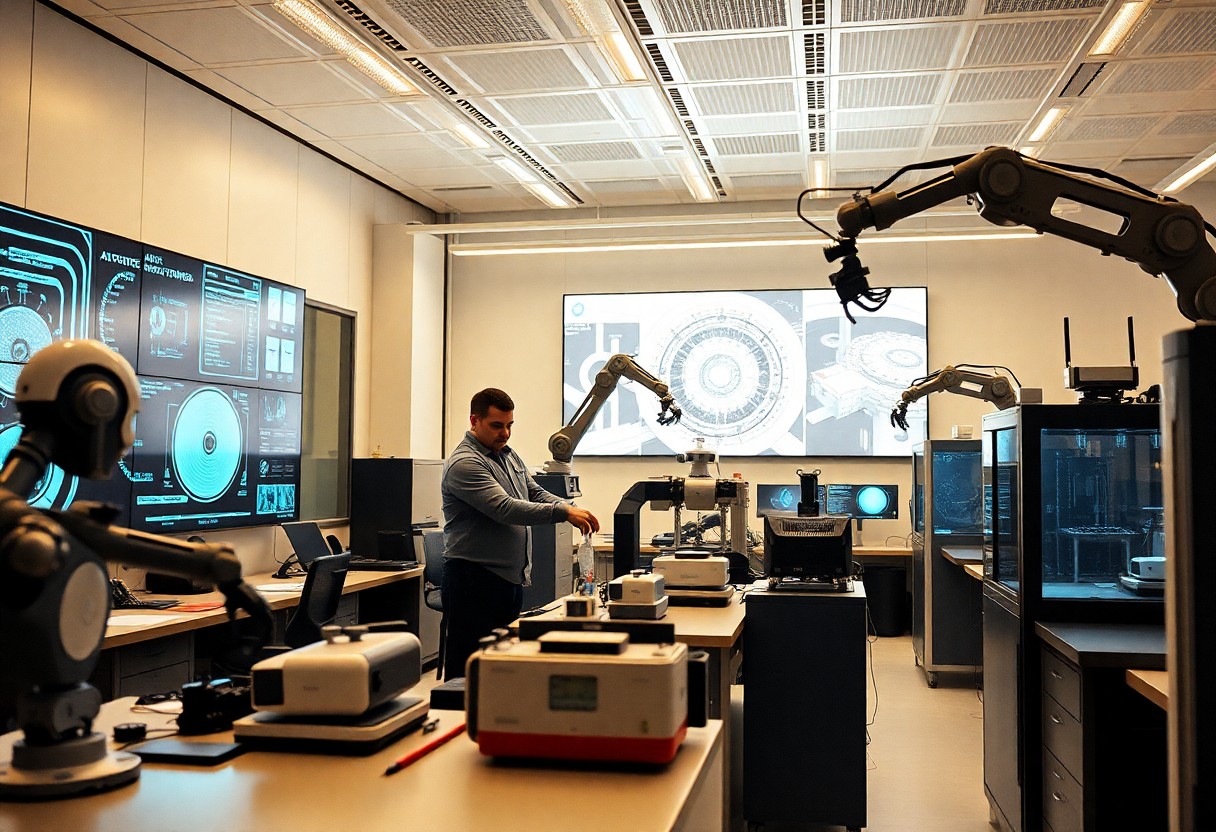AI is rapidly transforming the business landscape, raising the question of how self-directed AI can enhance your entrepreneurial endeavors. As you explore this innovative technology, you may wonder how it might redefine productivity, streamline operations, and simplify decision-making processes. In this blog post, we will examine into the potential of self-directed AI to usher in unprecedented levels of ease for entrepreneurs, empowering you to navigate the complexities of modern business with greater confidence and efficiency.
Reimagining Work: The Role of Self-Directed AI in Daily Operations
Incorporating self-directed AI into your daily operations can fundamentally transform how your business functions. This innovative technology not only takes over repetitive tasks but also empowers you to make better strategic decisions. By allowing AI to handle mundane activities, you can focus on creative problem-solving and customer engagement, ultimately reshaping your work experience and enhancing your entrepreneurial journey.
Streamlining Decision-Making Processes
Self-directed AI simplifies decision-making by providing data-driven insights at lightning speed. Instead of sifting through mountains of data or subjective opinions, you receive relevant and actionable intelligence that supports informed choices. This efficiency reduces the time spent on deliberation, allowing you to direct your focus towards growth and innovation.
Enhancing Productivity through Automation
Automation powered by self-directed AI not only elevates productivity but also frees up valuable resources. You can automate various tasks, from customer communications to inventory management, leading to significant time savings. For instance, a recent survey revealed that businesses utilizing AI automation experienced up to a 40% increase in operational efficiency, highlighting its potential to transform your workflows.
Consider the role of AI in streamlining your emails and scheduling. Tools like automated response generators can analyze past communications to formulate personalized replies, saving you hours each week. Similarly, AI-driven scheduling systems prioritize meetings based on urgency and importance, ensuring that your calendar is optimized for maximum productivity. Embracing these technologies allows you to allocate more time towards strategic initiatives rather than getting bogged down by routine tasks, ultimately driving your business forward.

The Entrepreneurial Landscape Transformed: Emerging Opportunities
With the infusion of self-directed AI into the entrepreneurial world, the landscape is noticeably shifting. You can now leverage AI capabilities to identify untapped market opportunities, streamline operations, and innovate with precision. This powerful technology offers you a gateway to harnessing insights that were previously too labor-intensive or complex, thus restructuring your approach to business growth and enabling you to seize new avenues for profit.
Identifying New Market Niches Enabled by AI
AI’s advanced analytics and predictive capabilities allow you to pinpoint emerging market niches with remarkable accuracy. By analyzing vast datasets, you can uncover trends and customer preferences that might otherwise go unnoticed, enabling you to tailor products or services that meet these new demands before your competitors do.
Cost Reduction and Resource Optimization
Integrating self-directed AI into your operational processes can lead to significant cost savings and enhanced resource management. AI-driven systems autonomously analyze workflows to identify inefficiencies, allowing you to allocate resources more effectively and reduce overhead. For instance, businesses using AI for inventory management have reported up to a 30% decrease in holding costs by optimizing stock levels based on real-time data, which can free up capital for other investments.

Challenges Ahead: Navigating Risks and Ethical Considerations
The promise of self-directed AI is paired with a range of challenges that demand consideration. Entrepreneurs must navigate potential pitfalls, including over-reliance on AI systems, the ethical implications of decision-making algorithms, and the risks to personal and organizational data. As technology evolves, understanding the legal and moral responsibilities tied to these tools becomes paramount. Balancing innovation with ethical guidelines will ultimately shape the future landscape of entrepreneurship.
The Dilemma of Dependence on AI
Your growing reliance on self-directed AI may create a dependency that undermines your entrepreneurial instincts. As AI systems take on more decision-making responsibilities, there’s a risk that your critical thinking and problem-solving skills might atrophy. Striking a balance is important; leveraging AI’s capabilities should enhance your creativity and strategic thinking rather than replace them altogether.
Addressing Privacy and Security Concerns
Privacy and security issues linked to AI deployment are paramount, with breaches potentially endangering sensitive information. The integration of AI into your business framework means safeguarding customer data, requiring vigilant implementation of security measures and compliance with relevant regulations. Failure to protect this data can lead to devastating consequences, including diminished trust and significant financial penalties.
Data breaches pose a significant threat as AI systems process vast amounts of personal information. You must understand that many AI applications rely on extensive data collection, increasing vulnerability to cyberattacks. Implementing robust cybersecurity measures is not optional; businesses have experienced up to a 60% increase in data breaches linked to AI tools. Adopting strong encryption, regularly updating your software, and conducting security audits can shield your enterprise from potential breaches, fostering a trustworthy environment for your customers while adhering to data protection regulations such as GDPR and CCPA.

Tools and Technologies Shaping Tomorrow’s Entrepreneurs
Emerging technologies are redefining the entrepreneurial toolkit, making it easier and more efficient to launch and scale businesses. You’ll find tools utilizing machine learning, automation, and analytics that enable you to streamline operations, improve customer engagement, and drive innovation. The rise of self-directed AI platforms is particularly notable, offering a suite of applications that empower entrepreneurs to make informed decisions without extensive technical expertise. As each new tool enters the market, the barrier to entry lowers, allowing aspiring business leaders to harness powerful capabilities once reserved for large enterprises.
Key Self-Directed AI Platforms and Their Features
Numerous self-directed AI platforms offer distinct features tailored to meet the diverse needs of entrepreneurs. For instance, tools like OpenAI’s ChatGPT can assist in content creation, while platforms like Salesforce Einstein provide advanced analytics for customer behavior. These platforms typically boast user-friendly interfaces, extensive data integration capabilities, and customizable functionalities, allowing you to adapt the technology to your unique business requirements. As the AI landscape evolves, staying informed about new entrants and their offerings can help you leverage the best tools for your entrepreneurial journey.
Integrating AI Solutions into Existing Business Models
Integrating AI solutions into your existing business model requires a strategic approach that aligns with your objectives and resources. Success hinges on careful evaluation of current processes, identifying areas where AI could enhance efficiency or customer satisfaction. For instance, you might implement chatbots to handle customer inquiries or utilize predictive analytics for inventory management, ensuring resources are allocated effectively. The process entails trial and error, as well as training and guidance for your team, to fully realize the potential of these technologies.
When integrating AI solutions, consider how they can streamline operations within your existing frameworks. Businesses that have successfully adopted AI often cite a phased approach that involves piloting specific applications before broader implementation. For example, if your company relies on email marketing, introducing AI-driven tools to segment audiences and personalize messages can significantly improve engagement rates and conversion. Overall, the key lies in recognizing that each integration is a unique opportunity to harness innovation that aligns with your business goals while maximizing efficiency and growth potential.
The Future of Entrepreneurship: Visionary Perspectives
As you envision the future of entrepreneurship, you may find yourself considering a landscape where self-directed AI streamlines processes, fosters creativity, and enhances decision-making. The integration of AI tools will not only democratize access to resources but also transform traditional business models, enabling you to innovate without the high capital barriers previously experienced. This new epoch promises to elevate your potential, enabling you to focus on strategic growth while leaving mundane tasks to AI-driven solutions.
The Evolution of Business Strategy with AI
AI’s integration into business strategy means rethinking traditional approaches to competition and market engagement. You will likely leverage predictive analytics, customer insights, and even AI-generated strategies that adapt in real-time, allowing for agile adjustments to your business model. This evolution may shift your focus from reactive planning to proactive foresight, empowering you to anticipate market needs and innovate accordingly.
Insights from Industry Leaders and Innovators
Insights from influential entrepreneurs and innovators highlight the transformative capabilities of self-directed AI. You can glean actionable strategies from case studies of enterprises leveraging AI for personalization, efficiency, and market analysis, pointing to a future where your business can thrive through increased adaptability and responsiveness to consumer trends.
Industry leaders, such as Sundar Pichai of Google, emphasize that AI isn’t just a tool; it’s a partner in innovation. Startups like OpenAI and established corporations are using AI to optimize operations and enhance customer experiences. For instance, leaders in retail are employing predictive analytics driven by AI to tailor recommendations and improve inventory management. Real-world applications demonstrate how this technology can increase sales and customer satisfaction while lowering operational costs. As you navigate this transformation, these insights will serve as invaluable guides, helping you integrate AI’s capabilities into your operational strategy effectively.
Summing up
Following this exploration, you can appreciate how self-directed AI could revolutionize your entrepreneurial journey. By streamlining processes, enhancing decision-making, and automating routine tasks, AI stands to reduce barriers and increase efficiency in your ventures. As these technologies continue to evolve, embracing self-directed AI may very well position you at the forefront of a new era in business, allowing for innovative ideas to flourish with greater ease than ever before.
Q: What is Self-Directed AI and how does it differ from traditional AI models?
A: Self-Directed AI refers to artificial intelligence systems that are capable of making autonomous decisions based on learned data without continuous human oversight. Unlike traditional AI models, which often rely on pre-programmed responses and heavily depend on human intervention for guidance, Self-Directed AI utilizes advanced algorithms to analyze complex datasets, derive insights, and generate solutions independently. This ability could significantly enhance efficiency in various fields, including entrepreneurship, by enabling quicker decision-making and reducing the need for micromanagement.
Q: How can Self-Directed AI impact entrepreneurial operations and decision-making?
A: The integration of Self-Directed AI into entrepreneurial operations can streamline various processes such as market analysis, customer service, and product development. By leveraging its ability to process large amounts of data rapidly, entrepreneurs can make informed decisions that are backed by empirical evidence rather than intuition alone. This shift could potentially minimize risks associated with launching new products or entering markets by providing predictive analytics and real-time insights into consumer behavior and trends. Additionally, it allows entrepreneurs to focus their energy on strategic initiatives rather than day-to-day operational tasks.
Q: Will Self-Directed AI lead to a decrease in the need for human involvement in entrepreneurship?
A: While Self-Directed AI can enhance efficiency and streamline tasks, it is unlikely to entirely eliminate the need for human involvement in entrepreneurship. Human intuition, creativity, and emotional intelligence remain vital elements in the entrepreneurial landscape. Self-Directed AI can serve as a powerful tool that provides decision-makers with data-driven insights, but entrepreneurs will still need to provide strategic direction, ethical considerations, and a human touch to relationships with customers and partners. Therefore, rather than replacing human roles, Self-Directed AI is poised to complement human efforts and facilitate a new collaborative approach to entrepreneurship.

